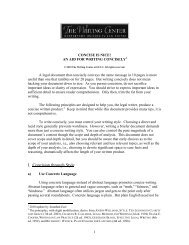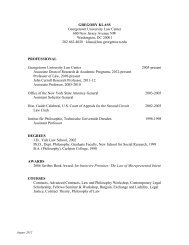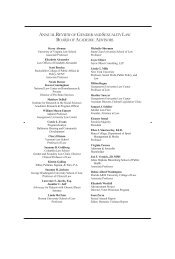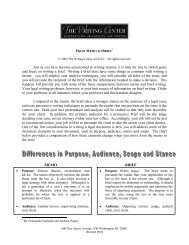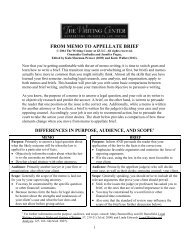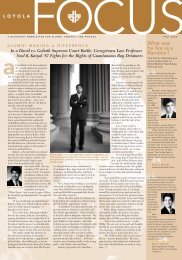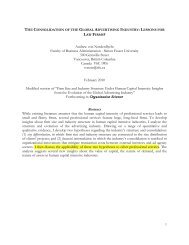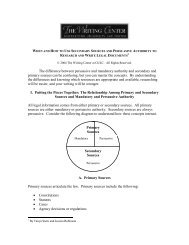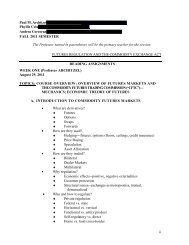Date: April 12, 2013 Topic: The Shrinking ... - Georgetown Law
Date: April 12, 2013 Topic: The Shrinking ... - Georgetown Law
Date: April 12, 2013 Topic: The Shrinking ... - Georgetown Law
You also want an ePaper? Increase the reach of your titles
YUMPU automatically turns print PDFs into web optimized ePapers that Google loves.
Limiting the Damage of Lateral Partner Movement:<br />
Exit Quantity, Geographic Focus, and Multiple Movers<br />
Rhett Brymer<br />
Miami University, Farmer School of Business<br />
Len Bierman<br />
Texas A&M University, Mays School of Business<br />
Partner movement between law firms has become commonplace in the legal labor<br />
market. While historically the movement of partners was a relatively rare phenomenon compared<br />
to the movement of professional managers within other industries, law firms now must cope with<br />
the realities of an active lateral market. <strong>The</strong> human capital loss when partners exit presents<br />
several organizational issues – partner disruption of social structures and their associated<br />
routines, diminished firm expertise, and the erosion of firm-client relationships. Greater amounts<br />
of turnover are associated generally with negative firm performance outcomes, such as decreased<br />
returns on sales. What is not understood well, though, is what types of partner loss are more or<br />
less detrimental. Further, organizations may be structured in particular ways that can help<br />
mitigate possible negative effects. Thus, it is of strategic importance that law firms understand<br />
the implications of who leaves and how to structure the firm to best brace human capital loss.<br />
As such, this study seeks to answer the following research questions: What variables<br />
determine the impact of the loss of partners from law firms? Specifically, what characteristics of<br />
the remaining firm, the exiting partners, and their destinations erode the focal organization’s<br />
value generating capability? Finally, what strategies can law firms employ to ameliorate the<br />
damage from exiting partners?<br />
Using over 19,000 lateral partner events within the American <strong>Law</strong>yer 200 law firms over<br />
an eight year period (2000-2007), this study examines the effect of exiting partners on the<br />
financial performance of the firm. Consistent with turnover research in other industries, greater<br />
amounts of partners leaving is associated with decreasing return on sales (ROS) performance.<br />
For example, five partners leaving is associated with a 8.2% decrease in ROS the following year.<br />
Fifteen exiting partners is associated with a 13.2% decrease. Interestingly, these performance<br />
impacts are independent of several measures of lawyer quality, such as lawyer rating, tenure,<br />
level of education, and law school quality. <strong>The</strong> characteristic of exiting partners that does make a<br />
notable impact is whether or not the partner is a “multiple mover”, i.e., a partner who has<br />
switched firms in a previous year and thus has moved laterally at least twice in her/his career.<br />
Losing more multiple movers ameliorates the negative performance effect. If the concentration<br />
of these multiple movers is high enough in the exiting partner group for any given year, the<br />
subsequent effect on the performance of the firm can actually turn positive.<br />
Additionally, firm structural variables are tested to determine which organizational forms<br />
are more robust to high levels of partner exit. <strong>The</strong> leverage of the firm, i.e. the number of<br />
associates per partner, has a direct negative effect on ROS, but has no effect when coupled with<br />
the number of partners exiting in a particular year. However, more geographically diverse firms<br />
are subject to worse firm performance when many partners leave as compared to geographically



